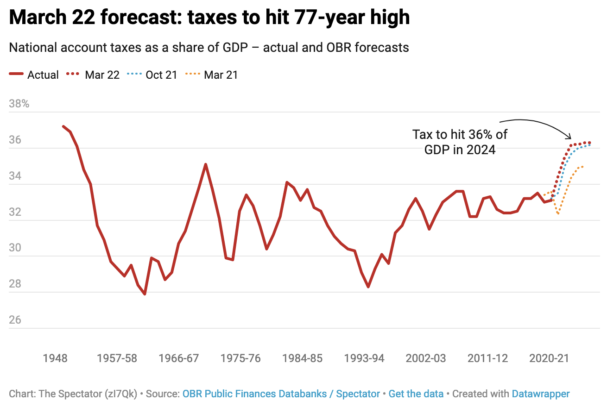It is been a familiar story in recent years: a Budget that sounded reasonably good when delivered, but that unravels in subsequent days. Rishi Sunak’s spring statement was no exception. When he delivered it a fortnight ago, he said he was going to compensate low-earners by raising the primary threshold for National Insurance, bringing it into line with income tax and relieving people who earn less than £12,500 from having to pay NI at all. But as the 1.25 percentage point rise in National Insurance kicks in today, it turns out that the rise in the threshold for NI will not take effect for another three months, on 6 July. In the meantime, any employee who earns more than £9,880 a year will be paying 13.25 per cent of their earnings on NI.
As for the cut to the basic rate of income tax from 20 per cent to 19 per cent, we will have to wait two years for that. And in the meantime, thanks to the freezing of tax thresholds, many more people will have been sucked into the 40 per cent income tax rate. At some point, it will no longer be fair to call the ‘basic rate’ by that name – 40 per cent will become the main rate.
But we accept 20 per cent as the basic rate for the moment, the switch from income tax to NI contributions in recent decades has been remarkable. In 1979, the basic rate of income tax was 30 per cent and the main rate of NI for employees was 6.5 per cent. Notionally, the combined rate of basic rate income tax and NI – at 33.5 per cent – is now lower than it was then. But that ignores a very important difference: NI is only payable on earnings, and only then on earners below the retirement age.

Continued cuts to income tax rates combined with rises in NI rates have skewed the tax system rather horribly against people who work for a living, while sparing pensioners and other people who live off investments, trust funds and property. We have moved from a tax system where, under the 1970s Labour government, unearned income was penalised – levying up to 98 per cent in some cases – to one which punishes earned income.
Did successive governments of all colours – Labour, Conservatives and the coalition all contributed to the switch – really mean to create such a tax system? Or did they keep skewing the system because they thought that we would be less likely to notice a rise in NI rates than we would a rise in income tax? It is hard to believe they deliberately set out to punish the workers, which leaves the second possibility: they calculated that they would enjoy popular support by cutting income tax and that this support would not be eroded too much by simultaneous rises in NI rates.
Yet surely that calculation has changed now. Most workers will soon notice the rise in NI rates today and that this will impact their living standards just as a rise in income tax rates would. The Conservatives were right when, in opposition, they called NI the ‘jobs tax’. If I were Keir Starmer I would not only oppose the NI rate rise – which he has done – I would revive the Tories’ old slogan and use it as a very potent weapon against them.
Got something to add? Join the discussion and comment below.
Get 10 issues for just $10
Subscribe to The Spectator Australia today for the next 10 magazine issues, plus full online access, for just $10.




















Comments
Don't miss out
Join the conversation with other Spectator Australia readers. Subscribe to leave a comment.
SUBSCRIBEAlready a subscriber? Log in